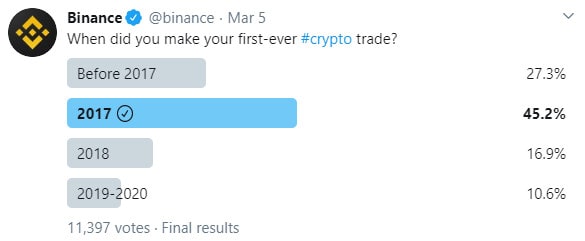Almost half of today’s active traders made their first-ever cryptocurrency trade back in 2017, according to a recent poll by Binance. At the same time, the number of pre-2017 traders is less than 30%.When Crypto Traders Entered The MarketThe world’s leading cryptocurrency exchange by volume, Binance, recently initiated a compelling survey. The question was, “when did you make your first-ever crypto trade?.”The results may not be all that surprising. Over a quarter of the 11,397 voters responded that it was before 2017. 17% voted 2018, and 11% traded for the first time in 2019-2020.Poll by Binance45%, or almost half, noted that they entered the market in 2017. In the relatively short history of cryptocurrencies, that year produced arguably the most substantial impact on the world.The main
Topics:
Jordan Lyanchev considers the following as important: AA News, Binance
This could be interesting, too:
Bitcoin Schweiz News writes VanEck registriert ersten BNB-ETF in den USA – Nächster Meilenstein für Krypto-ETFs?
Bitcoin Schweiz News writes Mit Binance kann jetzt jeder einfach 2’000 USDC verdienen: EARN TOGETHER
Bitcoin Schweiz News writes Bitpanda vs. Binance: Welche Bitcoin-App ist die beste für die Schweiz?
Bitcoin Schweiz News writes Binance: Warum diese Bitcoin-Börse die Konkurrenz abhängt!
Almost half of today’s active traders made their first-ever cryptocurrency trade back in 2017, according to a recent poll by Binance. At the same time, the number of pre-2017 traders is less than 30%.
When Crypto Traders Entered The Market
The world’s leading cryptocurrency exchange by volume, Binance, recently initiated a compelling survey. The question was, “when did you make your first-ever crypto trade?.”
The results may not be all that surprising. Over a quarter of the 11,397 voters responded that it was before 2017. 17% voted 2018, and 11% traded for the first time in 2019-2020.

45%, or almost half, noted that they entered the market in 2017. In the relatively short history of cryptocurrencies, that year produced arguably the most substantial impact on the world.
The main reason was the price actions going at the time. Bitcoin, for example, is the leading coin in terms of market capitalization, recorded its all-time high at the year’s end of nearly $20,000. The year of 2017 also received the infamous nickname “The Bitcoin Bubble,” despite that this was not the first bubble in the crypto space.
The consequences were more than evident. The traditional media was all over the cryptocurrency sphere as some reports even indicated that people were taking out mortgages to purchase the largest digital asset.
While the bubble inevitably burst and prices tumbled in the following year, lots of traders left the scene, but apparently, some have stayed still.
While many active traders discovered the crypto space in 2017, the following year of 2018 was nicknamed “the crypto bubble burst,” and this is well reflected in the poll’s results. What is more surprising is that only 10% joined the train during 2019 – 2020, this by itself leaves a lot of room to grow.
Room For Adoption
The cryptocurrency field is still in its early stages, with no doubts. It’s far from coming close to mass adoption, as some reports inform. For instance, a recent report outlined that only 23 million entities hold Bitcoin. Or, to say it in other words – only 0.3% of the total world’s population owns the most famous digital asset.
Another poll, conducted in the U.K. provided slightly more optimistic views on owning BTC. It ultimately concluded that 5.3% of all voters had some portions.
The situation in the United States is somewhat similar, as Cryptopotato reported previously. Out of 5,000 Americans, 6.2% said that they possess BTC.
Interestingly, both of these studies showed that over 20% of all participants answered that they have never heard of the largest cryptocurrency. It’s safe to assume that more education is needed on the matter as the general masses are strongly lacking information.
In any case, the previous massive bull run attracted a considerable portion of today’s traders. It would be interesting to follow if the same happens whenever the next major price surge comes.
